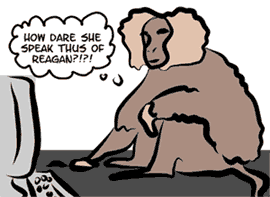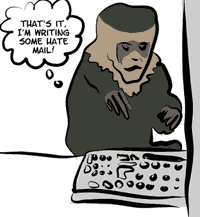Ook Ook Eek Eek!
I just moved to Canada and so I feel I’m qualified to be objective about American politics when I’m not running around and shouting "Commies! Pinkies!" at the natives here.
I’m kidding, of course, but how easy it is it for you to tell that without reading anything but that first sentence? So you’ll pardon me for not knowing myself exactly how much other people are kidding when they talk politics. And they do, despite one of the cardinal rules of polite society being "Never discuss politics or religion" ever. OK, maybe excepting political or religious meetings or with like-minded people. Or at the zoo with your neighborhood Bonobo, you get the point.
Even when you agree with someone’s politics, that doesn’t mean anything. Semantics, interpretations, and even quantity of fervor can cause more chaos than wild monkeys loose in the streets of New York City, and are also at least 70% less fun. So, with all this ground fraught with peril and misunderstanding, why is it so common to find political discussion (read: flamewars) so rampant in online comics, especially with the creators?
Because humor is a dangerous rhesus tool. Rhetoric. I mean rhetoric.
Look at Canada’s favorite documentary on American politics right now – Michael Moore’s Farenheit 9/11. The movie conveys ideas and thoughts that aren’t new, and neither do people normally think of going to a documentary for a good time, let alone a political documentary. What makes it palatable and popular beyond the publicity? Humor. Say what you will about Moore (and howler monkeys do), he’s funny when he wants to be. Which is more than you can say about the detractors who write columns titled "Less is Moore".
 Humor is a sly vehicle for most anything, and when used in rhetoric or debate, it is a powerful tool. You can use humor to get people to actually listen to things they would normally tune out. Or you use it to attack and fall back on the "It was just a joke" defense. The latter is deplorable behavior, much like flinging your own feces, but it works more often than not.
Humor is a sly vehicle for most anything, and when used in rhetoric or debate, it is a powerful tool. You can use humor to get people to actually listen to things they would normally tune out. Or you use it to attack and fall back on the "It was just a joke" defense. The latter is deplorable behavior, much like flinging your own feces, but it works more often than not.
Then there’s the longstanding tradition of political comics. Politicians have to take themselves seriously, which makes them prime targets for fun and jokes, and when you have such classic animals as the mdonkey and the elephant standing in for the political parties, how can anyone resist making cartoons about politics?
Or perhaps more to the point, why shouldn’t they? If humor is so accommodating for expressing political thought and able to both inform and entertain, why isn’t it prevalent in webcomics, where everyone has the space to set up their own little soap box? Jon Rosenberg of Goats recently said on the comic’s main page that "[c]omics are the perfect outlet for political speech and I’m saddened that they’ve become a playground for soft, mushy minds that would rather ponder the behavior of their pets than of their government". I don’t know if it’s as endemic as that, political cartoonists may even outnumber the ones in the funny pages of newspapers, but you don’t see the same trend on the Internet. If I may hazard a guess, and I obviously will, I’d say it’s because of "TEH DRAMA"!
Years ago, just before I joined the online comics scene, there was a renowned fiasco on some cartoonist email group. It caused the founding of ecartoonists, which later had a branch off for some "conservative cartoonists" list. No, this is not a list of political cartoonists, but regular old funnytellers and storytellers.
Yet somehow politics came up, and not only came up, but split the community. Twice. Politics causes drama and yelling and grudges and all sorts of unpleasantness, more so than any other topic. Not even macaques micropayments or copyright infringement comes close.
 But for all the negative effects of letting politics take a front seat to comics, readers seem to take it the same way they take anything creators do – either they can disassociate the creator from the comic or they can’t. How many people dislike Scott Kurtz, but still read his comic every day? I personally love quite a few comics that don’t jive with my own personal beliefs, comics that run the gamut from political cartoonist Mike Luckovich to Doonesbury to Superosity.
But for all the negative effects of letting politics take a front seat to comics, readers seem to take it the same way they take anything creators do – either they can disassociate the creator from the comic or they can’t. How many people dislike Scott Kurtz, but still read his comic every day? I personally love quite a few comics that don’t jive with my own personal beliefs, comics that run the gamut from political cartoonist Mike Luckovich to Doonesbury to Superosity.
I emailed Chris Crosby for his thoughts on the matter, as his two comics, Superosity and Sore Thumbs, deal with politics – both in very different ways. Sore Thumbs in particular has been dismissed solely in reviews on the grounds of its political leanings, despite making fun and belittling almost everything associated with politics equally. Crosby himself says that he puts a lot more of his personal leanings into Superosity than in Sore Thumbs, saying " I’m actually detached from any particular point of view when writing SORE THUMBS, though it obviously doesn’t seem that way to some outside observers."
His own focus seems to be on Entertainment over Messaging in the comic, but regulates his personal opinions to elsewhere on the comics’ sites. You can read in his leanings in the comics, though I’ve heard people say they thought Baby Bush (in Superosity) was portrayed as a sympathetic character. I asked about the inclusion of Bush in the comic and Crosby responded "When the 2000 election rolled around, it became just too hard to resist. How could I not? George W. Bush is both the most laughable and the most frightening political figure in US history… [T]he drunk driving was what got to me the most, which is why my "Baby Bush" take on him is so booze-related. He’s got an artificial heart that manufactures booze. Obviously, as with SORE THUMBS, it’s not supposed to be biting political satire, just a bit of a laugh loosely related to reality."
For Crosby, anyway, the entertainment value of tackling politics outweighs the controversy. "The political element [in Sore Thumbs] just seemed to fit and I thought it would be fun to write. I knew it would probably hurt the strip’s readership, but I couldn’t resist. I was trying to create a hit strip, but I wasn’t going to go CRAZY about it."
Unfortunately, Crosby neglected to mention monkeys throughout the entire interview and a family group of proboscis monkeys are en route to South Dakota even now. Further details at 11.

Meaghan Quinn is a contributing columnist for Comixpedia.
It’s a good thing the monkeys can’t actually find South Dakota; no one can.
One of the most frustrating things I dealt with during my college attempts at political humor was not when people completely missed my message, but when people misinterpreted something incidental in the comic and assigned (usually incorrect) meaning to the wrong element. I love subtle jabs, but my political jabs were probably so subtle as to be easily missed.
I also wish more people had a sense of humor when it comes to politics, and by that I mean “a sense of humor about their own beliefs/candidate/party”. I’m siding with Kerry this time around, but I see the humor potential in his personality and his platform. I don’t get why the office of President has to be a sacred one where presidential supporters (at this time, Bushites) get all up in a tizzy because you dare make fun of the President.
Sometimes I think the only way you can get away with making fun of someone in politics is to make fun of EVERYONE in politics: Much linked to example. But then you do have Sore Thumbs, which takes slack for that very thing.
That Jibjab flash was hilarious. Politics is serious though. Which is WHY political cartoonists are important – humor is sometimes the only way to cut through the mental defenses, the preconceived notions that people can insulate themselves with.
I hate traditional American editorial cartoons. Stale, funny without any edge or real point – most of these are about as relevant to life as Ziggy. I look instead to the web and alternative weeklies that have spawned comics that work in political and civic-minded opinions in ways that get to you. People can get offended as hell at this stuff as much as agree with it. That’s ok, it’s when people try to traitor-bait the cartoonists they don’t like and shut down discourse that is a shame and un-American.
You’ve got to be willing to protect the rights of the Ted Ralls and the Scott Kurtzs of the world if you really believe in free speech.
My favorite letters to the editor for humor purposes are always the people writing in about the political cartoons and threatening to cancel their subscriptions. Political cartoonists play it so safe these days, I’m surprised people can get offended at them. It’s the garfield-ification of politcal cartoons, and they can’t do the job you mentioned, of cutting through the mental defenses. They make Doonsbury look controversial, and I guess that’s why it was singled out for polling papers on whether to drop it or not. Doonsbury! I guess people are scared they’ll read it and slowly get won over to a character’s viewpoint?
You don’t see a lot of crosshatched pigs with suits and monocles in political cartoons anymore. Why is that?
They don’t?!
NOW WHO WILL BE INSPIRED TO MAKE THINGS LIKE BABE?!
Because they don’t require you to read Animal Farm in the 8th grade anymore.
-dreamshade
The wisest thing I ever heard suggested about how to deal with politics and politicians is the following:
“Look upon them with disdane, for that’s how they look upon you.”
If I remember correctly, even Plato thought they were a nessecary evil.
-William G